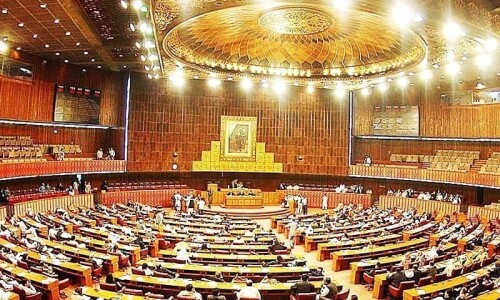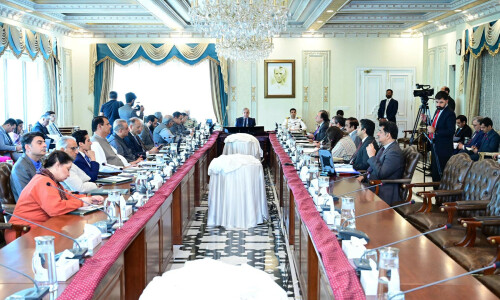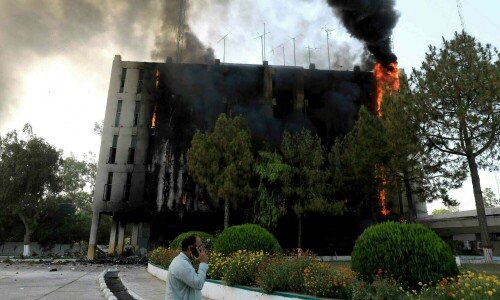The federal government tabled the Digital Nation Pakistan Bill, 2024, in the National Assembly session on Monday.
The bill — aimed to create a digital identity for citizens, to centralise social, economic, and governance data — was tabled by the Minister of State for IT and Telecommunication, Shaza Fatima Khawaja.
Today’s agenda said the legislation would “provide for the transformation of Pakistan into a digital nation, enabling a digital society, digital economy and digital governance”.
The bill was approved by the federal cabinet in June.
The bill, a copy of which is available with Dawn.com, said it was expedient to enable the people to become a digital nation by leveraging the transformative power of digital technologies, responsible use of data, innovative service delivery models and robust digital public infrastructure to accelerate sustainable economic development, improve citizen well-being, and modernise governance frameworks for efficient and effective public service delivery.
It further said it was expedient to create a forward-looking digital society, foster a thriving digital economy and establish a collaborative digital governance ecosystem with secure, inclusive, and interoperable digital public infrastructure as a key enabler supporting innovation, connectivity and seamless integration across sectors.
The bill said the establishment of the National Digital Commission and the Pakistan Digital Authority was necessary and would provide strategic direction, governance and operational oversight required to achieve the above objectives.
According to the bill, the National Digital Commission (NDC) is a body headed by the prime minister, including all four chief ministers and heads of organisations like the State Bank, Federal Board of Revenue and Pakistan Telecommunication Authority; while the Pakistan Digital Authority (PDA) would be led by top industry experts.
The bill said the NDC would prescribe the required policy, provide governance and ensure necessary coordination amongst federal, provincial, and sectoral bodies to achieve the objectives of a digital nation and align national digital transformation with economic growth, effective governance and societal development.
Among the main functions outlined for the NDC in the bill, it would have to approve the national digital masterplan and its implementation plans, provide strategic direction and governance to the PDA and coordinate with all relevant federal and provincial government entities, as well as regulatory bodies, to ensure a unified and collaborative approach to digital transformation across all levels of government.
The bill defined the national digital masterplan as the comprehensive strategic blueprint to transform Pakistan into a digital nation by fostering a digital society, digital economy, and digital governance that would be the central framework guiding digital initiatives, regulatory standards and guidelines and thus ensuring a unified digital agenda, eliminating redundancy and maximising resource efficiency.
The NDC would also have to issue directives to entities to align their strategic direction, policies, operations, and digital initiatives with the national digital masterplan, addressing inter-jurisdictional challenges and supporting effective implementation; ensure that the PDA had the requisite support, enabling conditions and resources to implement the masterplan effectively; and review cases of non-compliance with the masterplan referred by the PDA or NDC and may grant exceptions or issue further directives as necessary to ensure alignment with the masterplan.
Meanwhile, the PDA would develop, implement, monitor and periodically update the national digital masterplan, including sectoral plans and implementation plans, to ensure alignment with the strategic guidelines of the NDC.
Its other functions include similar activities related to the operations of the masterplan such as ensuring alignment with the plan; facilitating coordination between different stakeholders; establishing an evaluation frame for projects under the masterplan; reviewing plans relevant to the masterplan; developing and enforcing a national data strategy and comprehensive data governance framework within government entities and across public and private sectors, recommend governance, standards and operational compliance of cloud infrastructure within the public sector; ensuring alignment with national cloud policies; facilitate the development of a digital economy strategy; ensuring the development, strategic oversight and adoption of core digital public infrastructure and more.
One of the major propositions under the new regime is a digital identity for every citizen. It would include data about an individual’s health, assets and other social indicators.
The bill’s objective, as stated by officials, was to improve access to departments managing ID cards, land records, birth certificates and health records.
The digitisation effort would also target government departments, which will be given goal-oriented plans to improve services.
The new digital ID programme will be along the same lines as the initiatives implemented in the UAE, India and Estonia.
However digital rights experts have called for more clarity on how the government intends to secure the centralised data system.
Bill to ensure unified digital identity for citizens: Shaza
Khawaja said earlier today that the bill would soon be passed by parliament to establish a unified digital identity for citizens, aiming to centralise social, economic and governance data.
Addressing the National Broadband Network (NBN) Forum 2024 Gigabit for All, the minister said the legislation would “enable the transformation of Pakistan into a digital nation, fostering a digital society, digital economy and digital governance”.
The minister said that reliable, high-speed connectivity was an essential necessity for modern life, adding that the government’s digitisation strategy would prioritise three verticals: economy, governance and society, with a unified digital identity for every citizen at its core.
Khawaja said that 70 per cent of cabinet operations were already managed through e-governance, underscoring Pakistan’s commitment to leveraging technology for sustainable advancement and progress.
The minister stressed the importance of protecting children in the digital space, citing international examples such as Australia’s legislation regulating children’s social media usage and the US’s child protection laws.
She urged collective efforts to ensure a safe digital environment for the youth.
She said that Pakistan was ranked among the top tiers in the ITU Global Cybersecurity Index (GCI) 2024 due to the efforts of various departments, including the Federal Investigation Agency, Ministry of Defence and law enforcement agencies.















































